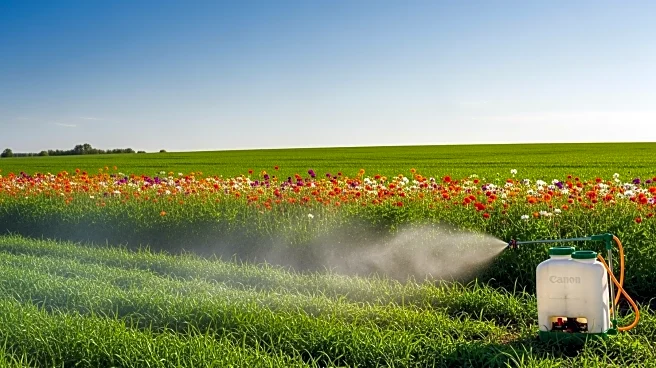What is the story about?
What's Happening?
The global agrochemicals market is experiencing significant growth due to the rising need for sustainable agriculture practices. The market, valued at USD 297.7 billion in 2024, is projected to reach USD 394.8 billion by 2033, with a compound annual growth rate (CAGR) of 3.2% from 2025 to 2033. This growth is largely driven by the increasing global population and the subsequent demand for enhanced agricultural productivity. Farmers are increasingly utilizing advanced fertilizers, pesticides, and herbicides to maximize crop yields and protect against pests and diseases. Additionally, the adoption of precision farming methods and integrated pest management systems is enhancing the effective use of agrochemicals. The trend towards bio-based and sustainable agrochemicals is also gaining momentum, influenced by environmental concerns and regulatory pressures.
Why It's Important?
The shift towards sustainable and bio-based agrochemicals is crucial for reducing environmental impact and ensuring food security. As traditional synthetic chemicals face tighter regulations, the demand for eco-friendly alternatives is rising. This transition supports soil health and reduces pollution, aligning with global sustainability goals. The agrochemicals market's growth reflects broader trends in agriculture, including the adoption of climate-smart practices and technological advancements. These developments are essential for meeting the food demands of a growing population while minimizing ecological harm. The industry's focus on innovation and sustainability is likely to drive further advancements in agricultural productivity and environmental conservation.
What's Next?
The agrochemicals market is expected to continue evolving with technological advancements in formulation and application methods. Innovations such as nanotechnology, controlled-release systems, and precision delivery systems are enhancing the efficiency of crop protection products. The integration of digital agriculture tools, including drones and AI-based crop monitoring, is improving the precision of agrochemical applications. As agriculture becomes more tech-oriented, the combination of digital tools and advanced agrochemical development is anticipated to alter the sector's expansion path. The collaboration between agricultural research institutions and the private sector is likely to foster further innovations in sustainable agriculture inputs.
Beyond the Headlines
The agrochemicals industry's shift towards sustainability and innovation has broader implications for global food production systems. The emphasis on bio-based products and precision agriculture reflects a growing awareness of soil health and environmental conservation. This transformation is not only driven by regulatory pressures but also by consumer preferences for organic and non-risky foods. The industry's adaptation to these trends is crucial for achieving resilient and sustainable food production systems. As companies allocate research funds towards precision-based agrochemicals, the sector is becoming more adaptive, data-driven, and focused on sustainability.















